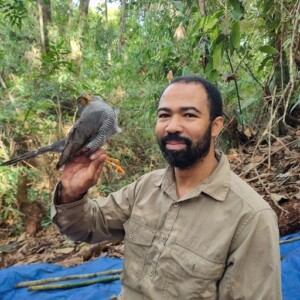
David J. Pereira
University of Birmingham
Project
ASSESSING BIODIVERSITY CHANGE ON ISLANDS THROUGH TIME: A MULTISCALE APPROACH
Supervisors
- Dr Tom Matthews
- Professor Jon Sadler
- Dr Joe Wayman
- Dr Tom Martin
PhD Summary
We now have a rough grasp of the coarse numbers of species that have gone extinct or are threatened with extinction, at least for terrestrial vertebrates. However, much work remains to be completed on understanding how extinctions equate to loss of ecosystem functions, the impacts of poorly-studied extinction drivers (especially regarding poorly-studied taxa) and, crucially, how best to mitigate the threats island biodiversity faces.
In this PhD I will examine three questions (i) how different taxonomic groups are faring in the current island biodiversity crisis, and how loss of functional roles varies spatially and between taxa (ii) the temporal trajectory of overall island biodiversity, particularly in response to specific extinction drivers, and (iii) how extinction threats on islands can be alleviated through conservation translocations.
Previous activity
I spent my working time advancing my experience within three main themes (as I saw it): Industry experience, Academic Research, Ornithologically-focused fieldwork.
Before commencing my PhD, and aligning with these themes, I worked as an Ornithology Consultant in the offshore wind industry at APEM ltd, where my role involved using R and QGIS to analyse remotely sensed seabird and marine mammal data. I calculated species abundance and density, created distribution maps, and compiled results into client reports. I also enjoyed developing new R codes for improved data manipulation and visualisation. I gained valuable skills that will come useful during the PhD, and equally important (if not more so) I made friends, some of which I still keep in contact with.
For academic research, I first lead my MSc thesis through peer-review to publication which required effective communication, project management, and self-motivation (as I did it alongside a full-time job). Upon completing this work, I was still extremely motivated to develop my research skills and was also concerned about the bird I studied (Bahama Warbler Setophaga flavescens) and its vulnerability to extinction by hurricanes, so together with a team of researchers from several institutions, we began a study into tropical cyclone threats to biodiversity hotspots’ fauna. During this work, I enjoyed working with two friends, and the challenge of learning as much as necessary about this subject. I also enjoyed writing sections of the manuscript, and using R and ArcMap to manipulate, combine and analyse large secondary datasets.
Lastly, I spent some of my spare time bird ringing in North Wales where I lived before the PhD. This, combined with birding, helped me to decompress and remind myself of the bigger picture.
Why did you choose doctoral research?
I decided to undertake Doctoral Research because I really enjoy the process of doing scientific research and I value the contributions it can make to society, particularly biodiversity conservation. I feel that research is how I can use my strengths to contribute positively to conservation – an issue I care deeply about. This drive emerged during my time studying two island endemic birds from the Bahamas for my MSc thesis (Bahama Warbler and Bahama Nuthatch). The process of designing the study, conducting fieldwork, doing the statistical analysis, learning R, and collaborating with my team provided me with a great sense of accomplishment. I also enjoy the challenges that investigative work and problem-solving bring. Since then, research has been the only work experience that has given me constant intellectual satisfaction and purpose.
Why did you choose CENTA?
I am passionate about self-development, and therefore, I hoped to learn and develop new skills in graphic design, public engagement, and scientific communication to help maximise the reach and impact of my work. The opportunity to undertake an internship during my PhD to gain professional experience and learn how research/knowledge/policy is applied on the ground was also incredibly appealing to me. A CENTA studentship will give me plenty of opportunities to develop skills and knowledge important in scientific research and beyond.
Future plans
My goal is to pursue a career in academic research, and completing a PhD is a vital stepping stone to achieve this. I hope that studying here and gaining a PhD will equip me with the proven skills in research and project management to secure a research job in post-doctoral research, or elsewhere where I am encouraged to conduct scientific research.
